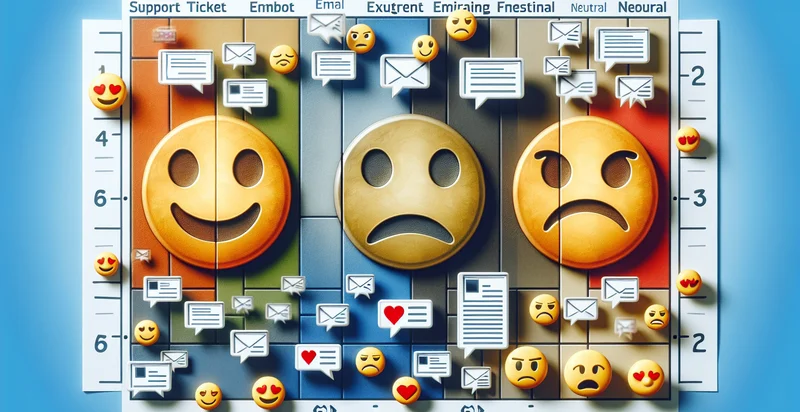Identify customer support sentiment
using AI
Below is a free classifier to identify customer support sentiment. Just input your text, and our AI will predict customer support sentiment levels such as positive, negative, or neutral. - in just seconds.

Contact us for API access
Or, use Nyckel to build highly-accurate custom classifiers in just minutes. No PhD required.
Get started
import nyckel
credentials = nyckel.Credentials("YOUR_CLIENT_ID", "YOUR_CLIENT_SECRET")
nyckel.invoke("customer-support-sentiment", "your_text_here", credentials)
fetch('https://www.nyckel.com/v1/functions/customer-support-sentiment/invoke', {
method: 'POST',
headers: {
'Authorization': 'Bearer ' + 'YOUR_BEARER_TOKEN',
'Content-Type': 'application/json',
},
body: JSON.stringify(
{"data": "your_text_here"}
)
})
.then(response => response.json())
.then(data => console.log(data));
curl -X POST \
-H "Content-Type: application/json" \
-H "Authorization: Bearer YOUR_BEARER_TOKEN" \
-d '{"data": "your_text_here"}' \
https://www.nyckel.com/v1/functions/customer-support-sentiment/invoke
How this classifier works
To start, input the text that you'd like analyzed. Our AI tool will then predict customer support sentiment levels such as positive, negative, or neutral..
This pretrained text model uses a Nyckel-created dataset and has 19 labels, including Appreciative, Content, Critical, Dismissive, Displeased, Dissatisfied, Encouraging, Frustrated, Happy and Indifferent.
We'll also show a confidence score (the higher the number, the more confident the AI model is around customer support sentiment levels such as positive, negative, or neutral.).
Whether you're just curious or building customer support sentiment detection into your application, we hope our classifier proves helpful.
Related Classifiers
Need to identify customer support sentiment at scale?
Get API or Zapier access to this classifier for free. It's perfect for:
- Customer Feedback Analysis: This use case involves analyzing customer feedback collected through surveys and social media. The sentiment identifier can classify comments as positive, negative, or neutral, helping businesses understand customer perceptions and prioritize areas for improvement.
- Chatbot Enhancement: By integrating sentiment analysis into chatbots, businesses can enable these digital assistants to better understand and respond to customer emotions. This can improve customer experience by allowing chatbots to escalate conversations to human agents when negative sentiments are detected.
- Ticket Prioritization: Customer support teams can utilize sentiment identification to prioritize support tickets based on the emotional tone. Tickets marked with negative sentiment can be flagged for immediate attention, ensuring that angry or frustrated customers receive quicker resolutions.
- Brand Reputation Monitoring: Companies can monitor social media channels and online reviews using the sentiment identifier to gauge public opinion about their brand. This proactive approach enables businesses to react quickly to negative sentiments and manage their brand reputation effectively.
- Product Improvement Insights: Sentiment analysis can uncover recurring themes in customer complaints or praise concerning specific products. By analyzing these sentiments, businesses can gain valuable insights for product enhancements or feature developments that align with customer desires.
- Training and Development: Customer service representatives can receive training based on sentiment analysis of their interactions with customers. Identifying patterns in agents' performance—such as handling high-sentiment cases—can lead to targeted coaching opportunities to improve overall service quality.
- Marketing Campaign Effectiveness: After launching marketing campaigns, businesses can use sentiment classification to analyze customer responses. Understanding how the audience feels about a campaign allows marketers to adjust strategies and messaging to better resonate with their target demographic.


